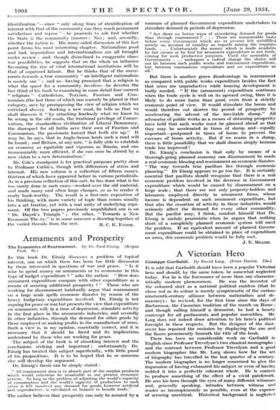Armaments and Prosperity
The Economics of Rearmament. By Dr. Paul Einzig. (Began Paul. 6s.)
IN this book Dr. Einzig discusses a problem of topical
interest, one on which there has been too little discussion by those interested in questions of war and peace. " Is it wise to spend money on armaments or to economize in this type of budget expenditure ? " asks the author. " How does armament expenditure compare with other expenditure as a means of securing additional prosperity ? " Those who are working for disarmament habitually argue that rearmament on a large scale spells economic disaster by reason of the heavy budgetary expenditure involved. Dr. Einzig is not arguing for peace or war but presents the view that expenditure on armaments will, in a time of depression, stimulate activity in the first place in the armaments industries, and secondly in other industries, through the demand for other goods by those employed or making profits in the manufacture of arms. Such a view is, in my opinion, essentially correct, and it is necessary that it should be faced and its implications understood by those 'who are working for peace.
, The subject of the book is of absorbing interest and the conclusions striking and important ; unfortunately Dr.
Einzig has treated this subject superficially, with little proof of his propositions. It is to be hoped that he or someone else will develop the argument.
Dr. Einzig's thesis can be simply "stated :
" All rearmament does is to absorb part of the surplus products which would otherwise be unsaleable in our present economic system. So long as the problem of adjusting the world's capacity of consumption and the world's capacity of production to each other is left unsolved any demand for goods, however artificial and unproductive, is calculated on balance to benefit trade."
The author believes that prosperity can only be assured by a measure of planned Government expenditure undertaken to stimulate demand in periods of depression.
" Are there no better ways of stimulating demand for goods than through rearmament ? . . . There are innumerable tasks before every Government which are at present left unfulfilled merely on account of timidity as regards raising the requisite funds. . . . Unfortunately the money which is made available by fair means or by foul for armament expenditure is not forth- coming for such productive purposes. Until the mentality of Governments . . . undergoes a radical change the choice will not lie between such public works and rearmament expenditure, but between rearmament expenditure and no expenditure at all."
But there is another grave disadvantage in rearmament as compared with public works expenditure besides the fact that arms are unproductive while housing development is badly needed. " If the (armament) expenditure continues when the trade cycle is well on its upward swing, then it is Ificely to do more harm than good, even from a strictly economic point of view. It would stimulate the boom and would therefore cut shorter the period of prosperity by accelerating the advent of the inevitable slump." All advocates of public works as a means of obtaining prosperity have held that such works must be planned ahead so that they may be accelerated in times of slump and—equally important—postponed in times of boom to prevent the excesses of boom activity. But if we rearm in a slump, there is little possibility that we shall disarm simply because trade has improved !
Dr. Einzig's conclusion is that only by means of a thorough-going planned economy can disarmament be made a real economic blessing and rearmament an economic disaster. " The way towards true pacifism lies through economic planning." Dr Einzig appears to go too far. It is certainly essential that pacifists should recognize that there is a real economic problem involved in the decrease in Government expenditure which would be caused by disarmament on a large scale ; that there are not only property-holders and labourers employed directly in armament firms, whose income is dependent on such armament expenditure, but that also the cessation of activity in these industries would seriously affect the demand for every other commodity. But the pacifist may, I think, comfort himself that Dr. Einzig is unduly pessimistic when he argues that nothing short of a completely planned economic system will meet the problem. If an equivalent amount of planned Govern- ment expenditure could be obtained in place of expenditure on arms, this economic problem would be fully met.
J. E. MEADE.




































 Previous page
Previous page